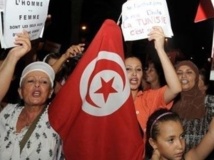
There are hopes that it may finally be able to overcome this crisis, which brought down the government of Hamadi Jabali, when parliament holds a vote of confidence on Tuesday for the new cabinet line-up of premier-designate Ali Larayedh.
His Islamist Ennahda party and its two secular partners in the outgoing coalition control 109 out of the 217 seats in the National Constituent Assembly.
But hopes of a breakthrough in Tunisia's political impasse are mitigated by deadlock over the new constitution.
The assembly must on Monday draw up a calendar for the drafting and adoption of the text, as well as for parliamentary and presidential elections.
But several political timetables drawn up since Ennahda's sweeping election victory in the first post-revolution poll have not been respected.
More than two years after Ben Ali's ouster, Tunisia is still without a fixed political system due to a lack of consensus between the main parties, Ennahda pushing for a pure parliamentary system and others demanding that the president retain key powers.
Tunisian politicians hope to see the constitution approved by the beginning of the summer, so that elections can be held in October or November.
Larayedh, who served as interior minister under Jebali, said his cabinet would work "to the end of 2013 at the latest," indicating that elections would take place before the third anniversary of the revolution in January 2014.
Assembly speaker Mustapha Ben Jaafar has called for an end to the tug-of-war, with the political uncertainty in Tunisia exacerbated by social tensions and the growing influence of militant Islamist groups.
"We must abandon narrow party interests even if that means making sacrifices, retreating. It is in the interests of Tunisians," said Ben Jaafar, whose secular Ettakatol is one of Ennahda's partners in the outgoing three-party coalition.
"Our people are patient but their patience has its limits, we must attend to their problems," he added.
But opposition parties have already made clear their disappointment with the coalition government, criticising the limited concessions made by the ruling Islamist party that prevented other parties from joining a broader coalition.
Ennahda points to the large number of ministries -- almost half -- that were assigned to independent candidates as proof of its flexibility, with technocrats appointed to head the key interior, foreign, defence and justice ministries.
"We fear that the neutrality of these ministries is just a facade," said Yassine Brahim, leader of the opposition Republican Party.
Mahmoud Baroudi from the Democratic Alliance, one of the groups that quit the negotiations to form a broad-based coalition, said "the programme of the government is still not clear."
Separately, Ennahda's opponents plan to gather on Saturday and Sunday, to mark 40 days since the assassination of Belaid, who was gunned down outside his home and whose funeral turned into the largest anti-government protest since the revolution.
The authorities have accused hardline Salafists for the murder and made a number of arrests, but the suspected killer remains at large.
------------------------------------------------------------------------------------------------------------------
His Islamist Ennahda party and its two secular partners in the outgoing coalition control 109 out of the 217 seats in the National Constituent Assembly.
But hopes of a breakthrough in Tunisia's political impasse are mitigated by deadlock over the new constitution.
The assembly must on Monday draw up a calendar for the drafting and adoption of the text, as well as for parliamentary and presidential elections.
But several political timetables drawn up since Ennahda's sweeping election victory in the first post-revolution poll have not been respected.
More than two years after Ben Ali's ouster, Tunisia is still without a fixed political system due to a lack of consensus between the main parties, Ennahda pushing for a pure parliamentary system and others demanding that the president retain key powers.
Tunisian politicians hope to see the constitution approved by the beginning of the summer, so that elections can be held in October or November.
Larayedh, who served as interior minister under Jebali, said his cabinet would work "to the end of 2013 at the latest," indicating that elections would take place before the third anniversary of the revolution in January 2014.
Assembly speaker Mustapha Ben Jaafar has called for an end to the tug-of-war, with the political uncertainty in Tunisia exacerbated by social tensions and the growing influence of militant Islamist groups.
"We must abandon narrow party interests even if that means making sacrifices, retreating. It is in the interests of Tunisians," said Ben Jaafar, whose secular Ettakatol is one of Ennahda's partners in the outgoing three-party coalition.
"Our people are patient but their patience has its limits, we must attend to their problems," he added.
But opposition parties have already made clear their disappointment with the coalition government, criticising the limited concessions made by the ruling Islamist party that prevented other parties from joining a broader coalition.
Ennahda points to the large number of ministries -- almost half -- that were assigned to independent candidates as proof of its flexibility, with technocrats appointed to head the key interior, foreign, defence and justice ministries.
"We fear that the neutrality of these ministries is just a facade," said Yassine Brahim, leader of the opposition Republican Party.
Mahmoud Baroudi from the Democratic Alliance, one of the groups that quit the negotiations to form a broad-based coalition, said "the programme of the government is still not clear."
Separately, Ennahda's opponents plan to gather on Saturday and Sunday, to mark 40 days since the assassination of Belaid, who was gunned down outside his home and whose funeral turned into the largest anti-government protest since the revolution.
The authorities have accused hardline Salafists for the murder and made a number of arrests, but the suspected killer remains at large.
------------------------------------------------------------------------------------------------------------------









 Home
Home Politics
Politics









